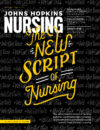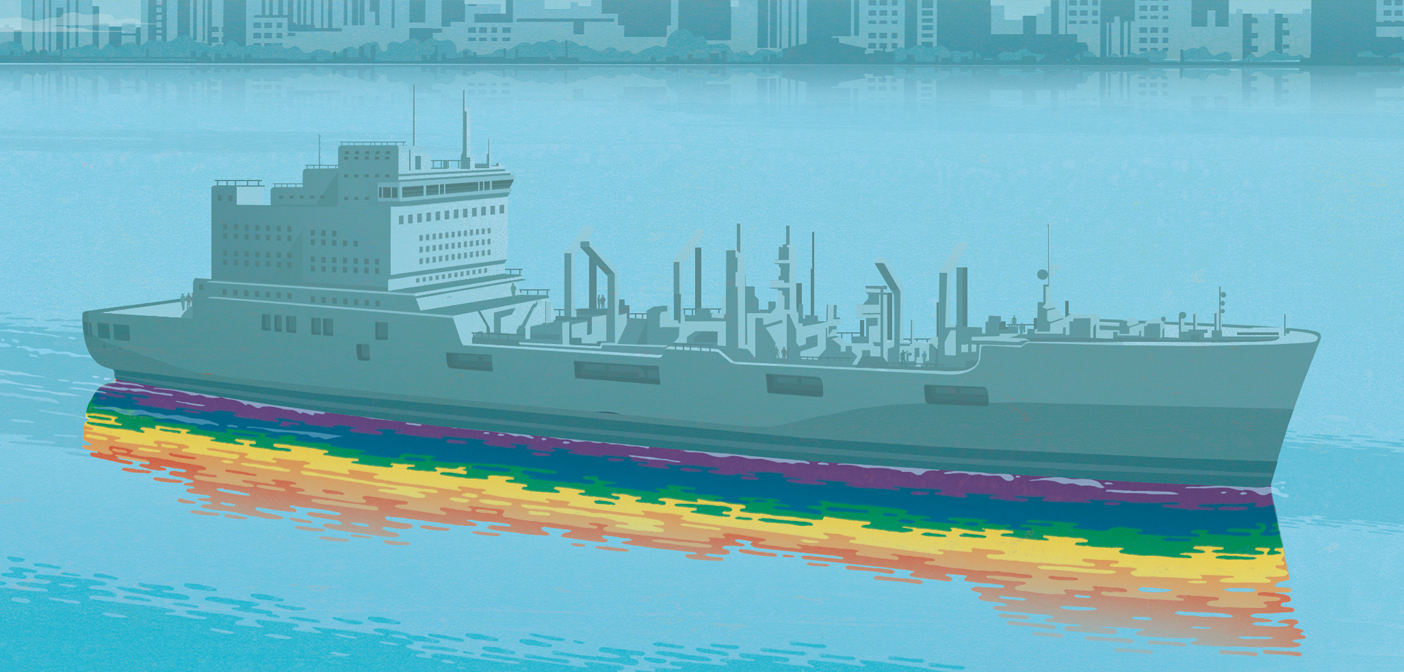By Steve St. Angelo
As summer ends, Paula M. Neira, RN, a U.S. Naval Academy grad, Desert Storm veteran, nurse, attorney, and civil rights activist, is ready to reflect on a season that brought a measure of peace and great pride to her life and to talk about her “faith in our country and our Navy being vindicated.”
“It was never that I wasn’t good enough to do the job. … I made an oath,” says Paula Neira of the decision to leave the U.S. Navy.“Twenty-five years from now, some kid will be able to do what I couldn’t do,” Neira explains on a patio outside the Johns Hopkins Hospital on September 20, coincidentally the fifth anniversary of the repeal of the military’s “Don’t Ask, Don’t Tell” policy that excluded those who identify as lesbian, gay, or bisexual from serving their country. The military’s policies that precluded gender and sexual minorities from serving cost Neira—who is transgender—her naval career but not her patriotism. Her heart remains broken, but she is buoyed by successes in the battle against such discrimination. She considers her activism a continuing service to the military, and the Navy has finally recognized it as such.
Neira, who worked as an attorney with the Service Members Legal Defense Network to bury “Don’t Ask, Don’t Tell,” was recently honored as a sponsor of the USNS Harvey Milk, a Navy oiler to be built as part of the John Lewis Class of service vessels. Sen. Diane Feinstein of California is co-sponsor. Neira says she feels blessed, even after such a torturous journey.
“It was never a choice to leave the Navy,” she explains, eyes welling with tears 25 years onward. “It was never that I wasn’t good enough to do the job. … I made an oath.” Navy and country first, no matter what. No lies. According to policy, “out” meant out. So, in September 1991, after Neira reached the decision to transition, she walked away, devastated and unsure of what career could possibly replace her “calling.” Her search led to nursing and to Johns Hopkins in 2007. She is now a nurse educator in the Department of Emergency Medicine, a “force multiplier,” she says in the military jargon that sprinkles her speech. (Neira asked that the interview occur at “1500,” or 3 p.m.)
“As a nurse, I can care for two to three patients. As a nurse educator, I can work with 15 nurses and maybe impact 45 patients.” And, of course, Neira is part of a team and of something bigger than herself, which is right in her wheelhouse.
“Particularly in emergency nursing, we’re dealing with people in crisis, where it’s literally life and death,” she explains. “To be able to have that kind of impact on people, to get them back to where they can get on with their lives, is very profound.”
She also has a spot on Johns Hopkins University’s Diversity Leadership Council, where she can impact many others, ensuring that patients’ race, creed, LGBTQ status, or fear of discrimination do not deny them the care they deserve.
Neira, who lives in Bowie, MD, is the first transgender Navy veteran to have her name corrected on her discharge paperwork by order of the Navy. “I hope one day, not too soon, to be inurned at the Arlington National Cemetery Columbarium, alongside my parents, with my true name on my tombstone,” she says. Neira, whose father served in World War II, recently returned to Annapolis for a reunion on the 40th anniversary of women’s admittance to the U.S. Naval Academy. (Neira admits to having had no clue, as a young male midshipman, of the challenges and discrimination female midshipmen were enduring. Still, “They have accepted me into their sorority.”)
Meanwhile, Neira continues to work on the military’s blind spot. “There’s still work to do,” she says. “But we’re making the Navy better. Diversity makes the Navy stronger. It makes the military stronger. It makes the country stronger.”
And bitterness need not apply. “How can you be angry when you’ve been given a chance to live up to your values? I’ve done nothing heroic or courageous. All I’ve done is what any other Naval Academy graduate would do: I saw something that was wrong and I acted to fix it. That’s what we do.” She adds proudly, “I am the person I professed to be.”
The USNS Harvey Milk (named for a San Francisco politician and former naval officer murdered for being openly gay) might not sail until 2021, Neira explains. She’s crossing her fingers that there will be a keel laying ceremony, during which sponsors weld their initials into the ship’s spine for all time. She knows she’ll be there for the champagne-bottle christening. “There’s plenty of time to practice my swing.” After that, she might just hop aboard.
“I feel a little sorry for the ship and the crew,” Neira jokes. She is likely the first sponsor who is also a qualified Surface Warfare Officer. “I’ve driven a destroyer alongside an oiler before. I don’t think any other sponsor can say that. For the crew, it means that I know firsthand the challenges of being at sea and that I want to get underway with them. Sponsors are meant to imbue the ship with their spirit, character, and personality. It’s like being the godmother for the life of the ship. As a godmother I can take care of my ship and her people—they become part of my family. My co-workers think of that as fairy godmother: bippity-boppity-boo! No, I’m the Godmother: I’ll make them an offer they can’t refuse.”Illustration by Stephan Schmitz — Folio Art
Sponsors are meant to imbue a ship with their spirit, character, and personality.

